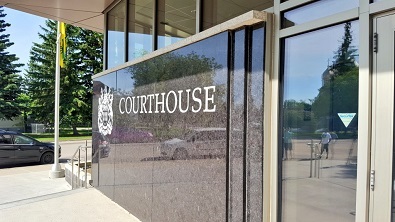The hearing is taking place at Meadow Lake Provincial Court. Photo by Chelsea Laskowski.
A child psychiatrist testified on Tuesday about his meetings with the La Loche teen who killed four people in January of 2016.
The teen surrendered at the Dene Building high school after injuring seven others, and has been in custody since then. Last year, he entered guilty pleas to first-degree murder of Marie Janvier and Adam Wood, second-degree murder of Dayne and Drayden Fontaine, and attempted murder to the seven injured.
The now-19-year-old is entering the second week of a two-week Meadow Lake hearing that will determine whether or not he will sentenced as an adult, and he cannot be named because he was a youth at the time of the shooting.
The Crown prosecutor called Dr. Declan Quinn as an expert witness on Tuesday, who appeared by video from Saskatoon. Quinn is the man who performed a court-ordered psychiatric assessment on the offender over the course of four different interviews last winter. Starting in December, all of the four hours-plus of interviews took place at Kilburn Hall, a youth custody facility in Saskatoon.
Quinn says his role was to determine the presence of any psychiatric conditions in the offender and to determine whether he had been fit to enter his October pleas, adding that it was not his role to find why the teen did what he did. On that subject, Quinn said the offender did not divulge any detail and “I’m as puzzled now as I was the first day I met him.”
Quinn said the offender was not suffering from any sort of psychotic episode during the shooting, instead saying there is great cause for concern that the offender was watching videos of American school shootings for at least a month prior. Although he “couldn’t get a good feeling why” the offender was watching the videos and looking into the shootings, Quinn said it was clear he had planned out the La Loche shooting in advance.
Quinn said after doing a number of evaluations, the offender’s most concerning psychiatric conditions include low self-esteem and anxiety, although not at a clinical level. He said the teen’s estimated twice daily marijuana smoking – 28 grams a month, an “incredibly large” amount – was in the level to count as a “substance abuse disorder.” Also notable on one self-test were high ratings for feeling depressed, anxiety, having a terrible attitude towards school, and a “conduct disorder,” meaning exhibiting repetitive patterns of behavior like breaking rules and lying that can get a kid into trouble.
He said in the evaluations, which took place almost a year after the shooting, the offender seemed to have on the low end of standard cognitive functioning for teens his age in English, even though Dene is his first language. Since the teen has been studying with a very low student-to-teacher ratio while in custody, defence lawyer Aaron Fox noted, his client has jumped a number of levels in his reading comprehension.
Quinn stated “he would do very poorly in a larger group setting,” and Fox said they had seen evidence that the offender was “sort of a student who fell through the cracks” even though it was identified throughout his school life that he had had problems that required extra care and attention.
Fox brought up examples of more than a decade of educational notes that the offender struggled while in school. At the time of the shooting, he was taking a third pass at Grade 10 after getting a 13 per cent grade in English the previous year and a final grade of 40 per cent.
At least one teacher said he was present in class, but did not do assignments and did not speak.
Quinn said even though the offender is 6’4″ doesn’t mean he is mentally done growing, and compared his brain to an iPhone – constantly updating – that can make huge developments over the next 10 years. When Fox asked if, with time, the offender may be able to better explain what happened and if he will need ongoing psychiatric services, Quinn said yes.
This hearing is set to last throughout the week. Once arguments close, Judge McIvor will be tasked with determining whether the shooter should be sentenced as an adult or as a youth.
